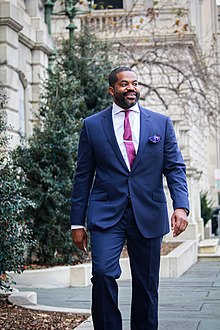Nick Mosby
[5] Mosby's first attempt for office was as one of seven competitors in the 2007 Democratic primary for the open seat in Baltimore's District 11 City Council seat, vacated by Keiffer Mitchell Jr.[9] In this race, competitor William H. Cole IV received the endorsement of The Baltimore Sun, Maryland Governor Martin O'Malley and Congressman Elijah Cummings, and Mosby went on to place 4th in the election with 10.45% of the vote.
[14][15] Mosby cited this negative media coverage, and Conaway's $21 million libel suit against a blogger as an impetus for him to run against her.
[30] In July 2013, when 20 city recreation centers were shut down as part of Mayor Rawlings-Blake's budget, Mosby spoke in favor of their continued operation under privatized administration, including one in Easterwood re-opened by his fraternity, Omega Psi Phi.
[32] Mosby called for hearings on the effects of sweetened beverages on children, and proposed legislation that to require warning labels on all advertisements for sugary drinks.
[40][41] In 2013, Mosby, along with fellow councilmember Carl Stokes, initially opposed the $107 million tax increment financing deal proposed by the Rawlings-Blake administration meant as incentive for the construction of Exelon's regional headquarters in the Harbor Point section of the city.
[43] In February 2014, Mosby supported Mayor Rawlings-Blakes' proposal for expansion of tax breaks for developers of apartment projects within the city.
[44][45] While praising support for new housing construction across his district and the city, Mosby recognized that investment in jobs and schools would be necessary in addition to development.
[46] He criticized Baltimore's affordable housing law as too weak, and sought to place more responsibility on developers to set aside units for low-income renters.
[47] As Baltimore overhauled its zoning regulations for the first time in decades, Mosby proposed "more stringent" requirements on liquor stores within residential neighborhoods, including a Public Nuisance Prevention Board that would have allowed community members to provide input on when to limit certain kinds of alcohol sales.
"[50] In 2013, Mosby sponsored Ban the Box legislation, which passed the city council the next year over the opposition of business groups like the Maryland Chamber of Commerce and the Greater Baltimore Committee.
[51][52] The bill, which Mosby characterized the act as the "most progressive" iteration in the country, expanded the city's existing prohibition on asking about criminal history on public job applications to private employers as well.
[55] In an attempt to assuage business critics, Mosby drafted an amendment to exclude job postings where a criminal record would be automatically disqualifying.
The final passed legislation applied to private employers with 10 or more employees, where a criminal history would not otherwise bar the candidate (such as in child care).
[62][63] Mosby proposed further restrictions on liquor stores in 2016, requiring that they not "adversely affect, jeopardize or endanger public health," but was unable to gain majority support on the council, who voted to remove his amendment from the final zoning package.
[65] In the hopes of diverting young men from work in the drug trade, Mosby encouraged urban farm projects within his district as an alternative way of making a living.
[69] In August 2013, Mosby worked with fellow councilmember Mary Pat Clarke to close a methadone clinic in the Hampden neighborhood, following complaints from local merchants about associated crime.
[73] Following the 2013 killing of Trayvon Martin, Mosby proposed a non-binding resolution calling on the city of Baltimore to boycott Florida-based businesses in protest.
Beginning in April, the couple organized weekly "Enough is Enough" marches, working with police and community groups to reduce crime and violence in West Baltimore.
"[77] Following the death of Tyrone West in July of that year, Mosby criticized the State's Attorney's level of transparency and communication regarding the investigation.
[90] He also praised Mayor Rawlings-Blake's decision to fire police commissioner Anthony Batts, saying he hoped it would allow for a "reset" of community-police relations.
[94] Mosby published an op-ed in the Sun calling for "political will" to use data analysis, like the CitiStat program, to modernize the administration of the city.
[100] As a candidate, Mosby called for the creation of a city task force "to help provide free expungements of criminal records, pay fees for Baltimore residents to seek GEDs, cover the cost of vocational training at Baltimore City Community College in certain high-demand job sectors, subsidize apprenticeship programs and refund the income taxes for unemployed ex-offenders to the business that hire them.
[107] In the televised Democratic Primary debates, opponents implied Mosby would have a potential conflict of interest if elected mayor, as his wife remained the city's state's attorney.
[120] Mosby was selected after the committee's original choice, Pugh aide Gary Brown Jr., was indicted for campaign finance violations.
[131] While serving on the House's marijuana legalization task force in 2019, Mosby suggested eliminating caps on the number of licensed producers in the state in order to avoid excluding racial minority owners from participating in the growing market.
[135] In May 2019, another Mosby-sponsored bill was successfully signed into law, this one providing up to $240,000 in annual tax credits to historically-black Maryland colleges and universities.
[136] Mosby was a critic of proposals in 2019 to move the Preakness Stakes from Northwest Baltimore's Pimlico Race Course to Laurel Park in neighboring Anne Arundel County.
Mosby criticized Governor Larry Hogan's removal of judicial discretion in applying mandatory minimum sentencing laws, arguing they have "never been an effective way of reducing violence.
[160][161][109][162][6] Shortly after his wife's election, Mosby stated he would recuse himself from any prosecutor-related matters in the city council, following speculation that the two might influence each other's actions in office.
[167] Later in October, Mosby received scrutiny over his joint ownership of a rental property that was reported to be unregistered with the city, and not listed as lead-certified.


